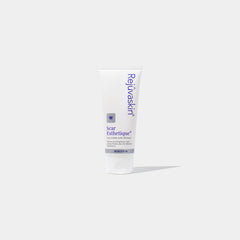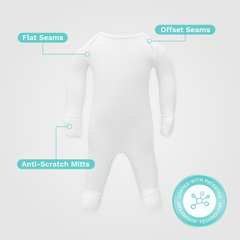There’s a lot of debate out there over what the best stretch mark treatments actually are— but one lens you may not have yet considered is how nutrition affects stretch marks. Can diet affect stretch marks? After all, diet affects pretty much every aspect of our body and its functioning, so why shouldn’t it affect skin growth?
Today we’ll discuss if nutrition can have any significant impact on your stretch marks, how to prevent stretch marks in general, and what the best vitamins for stretch marks may be.
What Nutrients Claim Collagen Benefits?
No nutrient has specifically designated “stretch mark benefits” — so instead we have to take a look at the primary source of stretch marks. Which would be collagen. Or, more specifically, the inability of collagen production to keep up rapidly growing skin.
So let’s take a closer look at some vitamins that aid in collagen production.
Vitamin C
They Say: Vitamin C is a vital nutrient that acts as an antioxidant, protecting the skin from damage caused by free radicals and promoting overall skin health.
The Science: External (topical) vitamin C application helps collagen stay at optimal levels in the skin. This study also found that dietary vitamin C helps collagen synthesis for tendons and bones heal. It could be assumed that dietary vitamin C would also help stretch marks, but there’s no direct evidence to prove it.
Sources of Vitamin C: citrus fruits, strawberries, bell peppers.
Zinc
They Say: Zinc is another essential nutrient that supports collagen formation and promotes skin repair. It aids in the production of proteins and DNA, vital for the regeneration of skin cells.
The Science: Very little evidence actually supports dietary zinc as a way to increase collagen production. It does appear, though, that zinc may reduce the likelihood of existing collagen from degrading. This may have implications on preventing stretch marks.
Sources of Zinc: nuts, seeds, whole grains, legumes
Vitamin E
They Say: Vitamin E is known for its antioxidant properties, protecting the skin from oxidative stress and potentially reducing the incidence of stretch marks.
The Science: Much like vitamin C, vitamin E is an antioxidant. There don’t appear to be any direct studies linking vitamin E to collagen synthesis (in fact, it can actually slow down collagen synthesis in the liver), but, since it’s an antioxidant, it theoretically could neutralize free radicals that may degrade collagen.
Sources of Vitamin E: almonds, spinach, sunflower seeds
Fatty Acids
They Say: Essential fatty acids, particularly omega-3 and omega-6, are integral components of healthy cell membranes and play a role in maintaining skin hydration and flexibility.
The Science: Some types of fatty acids (eicosapentaenoic acid, omega-3, fish oil) can stimulate collagen production. That very same study found that (arachidonic acid, omega-6) reduced collagen production. This goes to show that omega-3 and omega-6 supplementation are a balancing act and that omega-3 should outweigh omega-6 supplementation.
Sources of Fatty Acids: fatty fish, flaxseeds, chia seeds
So, What’s The Takeaway?
Incorporating the above nutrients into your diet may have potential benefits for skin health. However, a well-rounded approach, including proper hydration, regular exercise, and using topical products to nourish the skin, can complement the effects of a nutritious diet.
What Is the Best Topical Product for Stretch Marks?
A topical cream, like our Stretch Mark Cream, is a valuable addition to your skincare routine. Packed with skin-nourishing ingredients and collagen stimulants, it aims to provide targeted nourishment to affected areas. And remember, each individual's skin is unique, and what works for one person may not have the same effect on another!





















Leave a comment